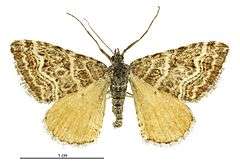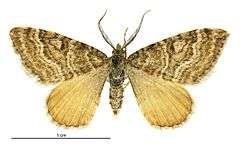Xanthorhoe bulbulata
Xanthorhoe bulbulata is a species of moth in the family Geometridae. It is endemic to New Zealand. It is classified as critically endangered by the Department of Conservation.
| Xanthorhoe bulbulata | |
|---|---|
 | |
| Female | |
 | |
| Male | |
| Scientific classification | |
| Kingdom: | |
| Phylum: | |
| Subphylum: | |
| Class: | |
| Order: | |
| Family: | |
| Genus: | |
| Species: | X. bulbulata |
| Binomial name | |
| Xanthorhoe bulbulata | |
| Synonyms | |
| |
Taxonomy
X. bulbulata was first described by Achille Guenée in 1868.[3][4] In 1883 Edward Meyrick placed the species within the genus Larentia.[5] In 1898 George Vernon Hudson assigned the species to the genus Xanthorhoe.[6]
Original description
Guenée described the species as follows:
Superior wings wood-brown, varied with pale and dark ; the fringe concolorons, preceded by small geminated black dots ; there are four white lines, the two first parallel and somewhat angulated, the third forming a band, divided by an interrupted white thread and followed by another very slender brownish line, the fourth simple, continuous and slightly shaky, no sub-apical line : inferior wings dark ochreous-yellow without any line, and simply with black terminal markings : under-side of all the wings ochreous-yellow without markings, excepting that on the inferior there is a little cellular dot, and a series of very small and distant black dots. Abdomen grey with several black atoms.[3]
Distribution and habitat
This species is endemic to New Zealand.[7] Historically this moth was distributed throughout much of the South Island with records obtained from as far north as Awapiri in the Awatere valley down to Invercargill.[8][9] The moths could be found in "open, grassy places" from sea level to elevations of 660-930m.[9] Records suggest that the moth was once "common" between September and March.[10]
Species decline
Despite having been common in New Zealand up to the 1930s,[11][10] since 1 January 1940 there have been only two recorded collections of X. bulbulata. These were a male found flying during the day in Queenstown in 1979 and a female caught in a light trap between February and March 1991 at the Eastern entrance to the Kawarau Gorge.[12] Intensive sampling for this moth covering 285 sites between 1995 and 2000 returned no specimens.[10]
It is thought that the documented decline in this species is the result of ecological changes to habitats following European settlement.[10]
Conservation status
This species has the "Nationally Critical" conservation status under the New Zealand Threat Classification System.[1]
References
| Wikimedia Commons has media related to Xanthorhoe bulbulata. |
| Wikispecies has information related to Xanthorhoe bulbulata |
- Hoare, R.J.B.; Dugdale, J.S.; Edwards, E.D.; Gibbs, G.W.; Patrick, B.H.; Hitchmough, R.A.; Rolfe, J.R. (2015). "Conservation status of New Zealand butterflies and moths (Lepidoptera)" (PDF). New Zealand Threat Classification Series. 20: 1–13.
- "Xanthorhoe bulbulata (Guenee, 1868)". www.nzor.org.nz. Landcare Research New Zealand Ltd. Retrieved 14 August 2017.
- Guenée, Achille (1868). "New species, &c., of heterocerous Lepidoptera from Canterbury, New Zealand collected by Mr R.W. Fereday". The Entomologist's Monthly Magazine. 5: 94. ISSN 0013-8908 – via Biodiversity Heritage Library.
- Dugdale, J. S. (1988). "Lepidoptera – annotated catalogue, and keys to family-group taxa" (PDF). Fauna of New Zealand. 14: 190. Retrieved 9 May 2018.
- Meyrick, Edward (1884). "A Monograph of the New Zealand Geometrina". Transactions and Proceedings of the New Zealand Institute. 16: 49–113 – via Biodiversity Heritage Library.
- Hudson, G. V. (1898). New Zealand moths and butterflies (macro-lepidoptera). London: Newman & Co. p. 68. doi:10.5962/bhl.title.7912.
- Gordon, Dennis P., ed. (2010). New Zealand inventory of biodiversity. Volume two. Kingdom animalia : chaetognatha, ecdysozoa, ichnofossils. Vol. 2. Christchurch, N.Z.: Canterbury University Press. p. 460. ISBN 9781877257933. OCLC 973607714.
- Hudson, G. V. (1898). New Zealand moths and butterflies (macro-lepidoptera). London: Newman & Co. p. 144. doi:10.5962/bhl.title.7912.
- Hudson, G. V. (1928). The butterflies and moths of New Zealand. Wellington: Ferguson & Osborn. p. 111.
- Brian., Patrick (2000). Conservation status of two rare New Zealand geometrid moths (PDF). New Zealand. Department of Conservation. Wellington, N.Z.: Dept. of Conservation. ISBN 0478219466. OCLC 54078998.
- Philpott, A (1901). "Catalogue of Southland Lepidoptera". Transactions and Proceedings of the New Zealand Institute. 33: 167–185.
- Patrick, B. H. (1994). Valley floor Lepidoptera of Central Otago. Dunedin: Department of Conservation. p. 54.
